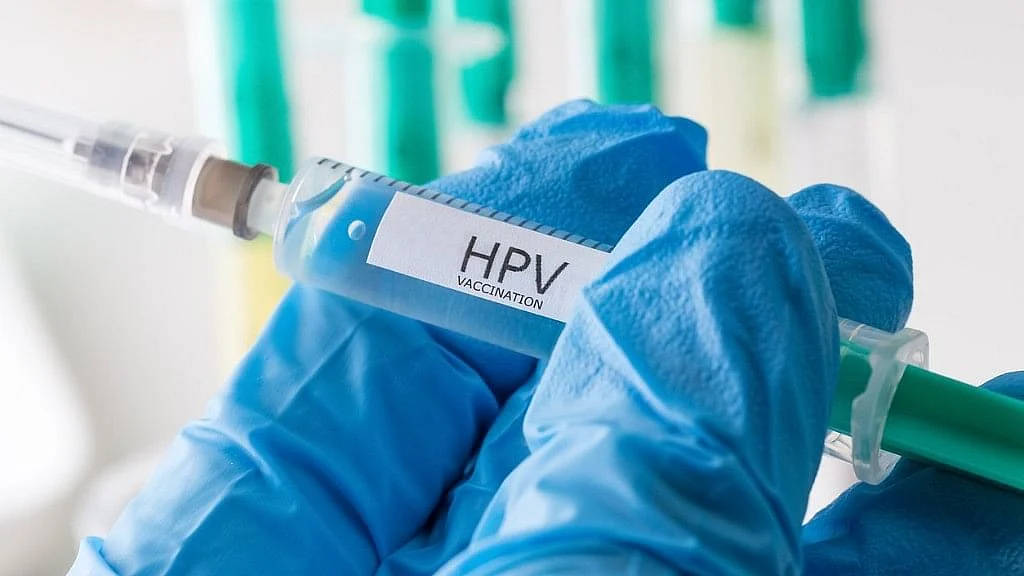HPV Vaccine Cuts Cervical Cancer By Nearly 90%: What Does New Study Say?
Cervical cancer is responsible for the deaths of more than 3,00,000 women each year.

advertisement
The human papillomavirus (HPV) vaccine has cut the risk of developing cervical cancer among women by nearly 90 percent, a study funded by Cancer Research UK found, the BBC reported.
The register-based observational study, published on 3 November, in the medical journal The Lancet said that HPV immunisation programme has almost eliminated cervical cancer in women born since 1 September, 1995.
This is the first study based on first real-world data.
Cervical cancer is responsible for the deaths of more than 3,00,000 women each year, as per World Health Organization (WHO). It is also the fourth most common cancer across the world.
What is HPV? What were the major takeaways from the study?
Here's all you need to know.
What is HPV?
Human papillomavirus (HPV) is a viral infection which is spread through sexual contact. As per WHO, most sexually active men and women will be infected at some point. But some might be repeatedly infected.
Studies show that HPV is largely unproblematic, as it clears without any intervention within a few months of being infected. But a certain type of HPV can stay and develop into cervical cancer.
There are more than 100 kinds of HPVs, pointed Mayo Clinic. However, cervical cancer is the most common type of cancer related to the HPV virus, according to WHO.
What were the major takeaways from the real-world study?
The reduction in cervical cancer rates by age at which they were vaccinated is: 34 percent among girls of 16-18 years of age, 62 percent among 14-16 years, and 87 percent among the ages 12 and13.
Additionally, it was found that the risk of pre-cancerous stage or grade 3 cervical intraepithelial neoplasia (CIN3) was reduced by 39 percent among girls of 16-18 years, 75 percent among 14-16, and 97 percent among ages 12 and 13.
When should I get screened for cervical cancer?
According to Centres for Disease Control and Prevention (CDC), one should start getting Pap tests at age of 21 or when one gets sexually active.
It can as long as three weeks to get test results.
If your test result is not normal, your doctor will advise you on the follow up.
How can I get infected with HPV?
One can get HPV by having vaginal, anal, or oral sex with anyone who has the virus. It is most commonly spread during vaginal or anal sex.
The risk is prevalent throughout the sexually active period, but it peaks between the ages 30 and 60.
Are there vaccines against HPVs?
Yes. There are currently three vaccines that have been prequalified, which protects against both HPV 16 and 18. This causes at least 70 percent of cervical cancers.
The third vaccine protects against five additional oncogenic HPV types, which cause a further 20 percent of cervical cancers, according to the WHO.
Who should get the HPV vaccine?
HPV vaccines should be given to all preteens at the age of 11 and 12 – before they become sexually active.
"Vaccination is not recommended for everyone older than age 26 years. However, some adults age 27 through 45 years who are not already vaccinated may decide to get the HPV vaccine after speaking with their healthcare provider about their risk for new HPV infections and the possible benefits of vaccination," CDC says.
Which are the approved vaccines against HPV?
As per CDC, there are three HPV vaccines that are licensed by US Food and Drug Administration. They are:
9-Valent HPV vaccine (Gardasil 9),
quadrivalent HPV vaccine (Gardasil)
bivalent HPV vaccine (Cervarix)
All three vaccines provide protection against HPV types 16 and 18 that cause most HPV cancers.
Is it available in India?
According to The Indian Express, in India, bivalent and quadrivalent HPV vaccines were authorized in 2008, while a non-valent vaccine was licensed in 2018.
I have received HPV vaccine. Should I still get screened for cervical cancer?
Yes. HPV vaccination is not a replacement to cervical cancer screening.